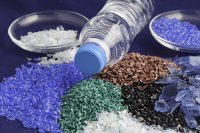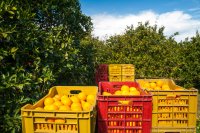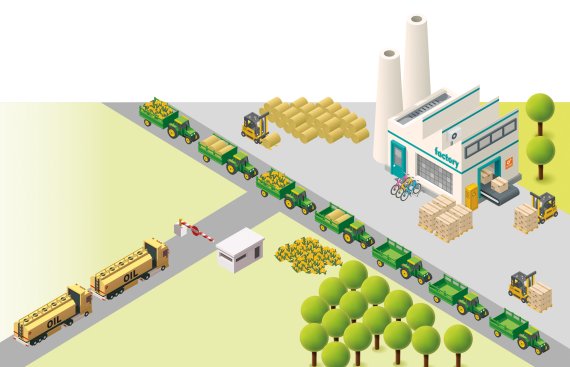Illustration Geert-Jan Bruins
The board, an environmentally variant on hardboard or MDF, is one of nine ongoing projects in the Biobased Performance Materials (BPM) programme. In this programme, co-financed by the Dutch top sector Chemicals, Wageningen UR and the industry are working on creating new biobased materials to replace existing oil-based products. Plants are the new oil.
The BPM programme has been running for some time. It was launched in 2009 by the then minister of Agriculture Gerda Verburg, with the aim of stimulating the biobased economy by bringing the industry, the universities and applied research institutes together. This initiative generated nine projects which have already been completed. The successful formula is being taken further in the Chemicals top sector.
Knowledge transfer
Christiaan Bolck, director of BPM, is proud of the programme. The fact that it is being followed up shows, in his view, that the topic is right. ‘It’s the way of working as well. The collaboration with industry in small projects and chain-wide with partners who don’t get in each other’s way. A textbook example of the way of working the government wants to see within the top sectors.’
A little under 5 million euros is being spent on the current second phase of the BPM programme. Sixty percent of the funding (3 million) comes from the government. Bolck: ‘We use that money for research. The industry funds part of it too, as well as contributing staff and material. The participating companies can make use of the knowledge that comes out of it: they have the first right to purchase.’ But the benefits of the collaboration go much further than this, says Bolck. ‘What I like about this form of collaboration is that a lot of knowledge transfer takes place. That is what you really want.’
Shortest route
The project got the green light last year. The agreements have been signed and most of the projects have started. The projects include Glue Reed (the reed-based board research), Hippie, Magic and Apps – they have a penchant for catchy acronyms at Biobased Products. The emphasis lies on creating substitutes for products currently made from oil. Bolck: ‘The reference point is the current product. You have to meet the criteria of use, otherwise the industry can’t do anything with it. But we look at other characteristics as well. Such as whether the material has other strength-related qualities or extra barriers to aromas.’
‘The approach is that we want to make use of the plant on the basis of its functionality,’ explains Bolck. ‘Traditional chemistry is all about splitting fossil fuels into their components. Then you have to add functions to those building blocks. But if you already have a plant, you don’t usually have to first take out all the functionality in order to put it back in later. So we like to take the shortest route, keeping natural functions as much as possible.’
Glue reed

Aim:
To manufacture board from reeds
Material:
Reed from Dutch nature reserves. Mowing and processing reed is expensive for nature conservation organization Natuurmonumenten. By making sustainable building material with them, the organization hopes to earn some money with the reeds.
Polymer:
That is a secret. The new biobased resin used to glue the fibres together replaces the existing formaldehyde-based resins which are harmful to people and the environment.
Challenge:
Making the reed suitable for processing into board, and developing a suitable biobased resin.
Partners:
DSM, Compakboard, Natuurmonumenten.
Magic

Aim:
To create an environmentally friendly dual-component resin for securing railway track sections to each other.
Material:
Plant-based oil from Croda, one of the participating partners
Polymer:
The resins currently used are polymers based on isocyanate. The familiar polyurethane is one such polymer.
Challenge:
To develop an alternative resin that is people- and environment-friendly but does what is needed: absorbing vibrations and sound.
Partners:
Edilon-Sedra, Croda
Hippie

Aim:
To create new polyesters for the construction, packaging, electronics and car industries, based on isoidide. Hippie stand for High Performance Polymers from isoididE.
Material:
Starch from maize or potatoes, for example.
Polymer:
Polyesters based on isoidide, a monomer (a building block for a polymer) which can be made from the sugar sorbitol, for example.
Challenge:
To develop biobased polyesters with useful characteristics and which can be produced on a large scale.
Partners:
Archer Daniels Midland, DuPont, Holland Collors.
Apps

Aim:
To make products such as horticulture crates and luxury packaging using die-casting and based on the biobased polyester PBS. Apps stands for APplications for biobased Polybutylene Succinate.
Material:
Succinate (obtainable from amber) and butanediol. Both building blocks are available in biobased form.
Polymer:
PBS (polybutylene succinate)
Challenge:
Adding characteristics such as toughness and thermal and chemical stability, which will make packaging material last longer.
Partners:
Reverdia, Teamplast, RPC Promens.

